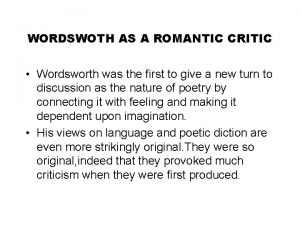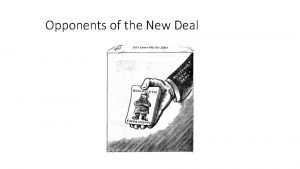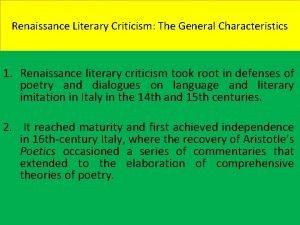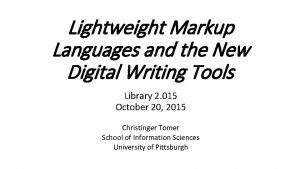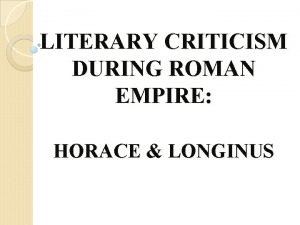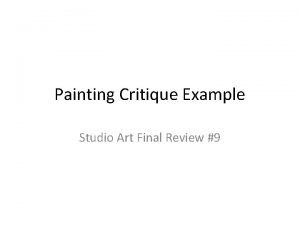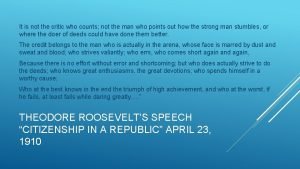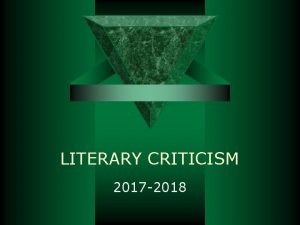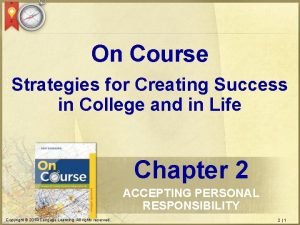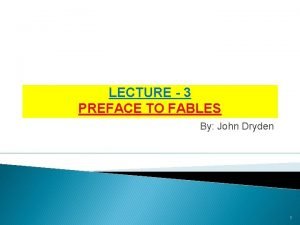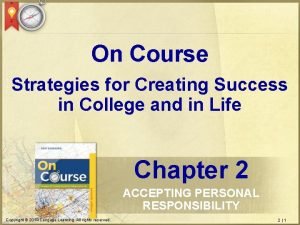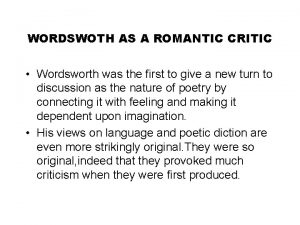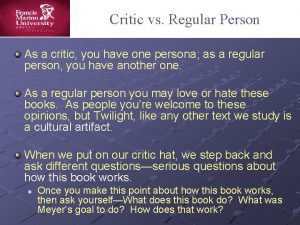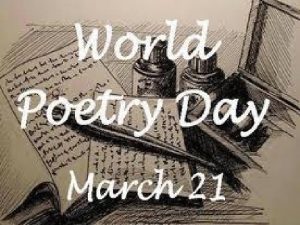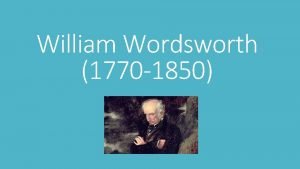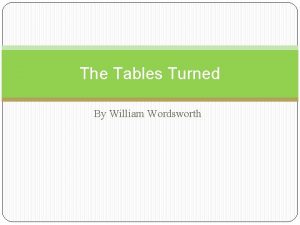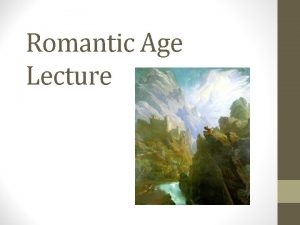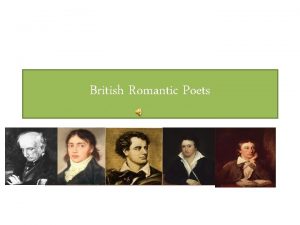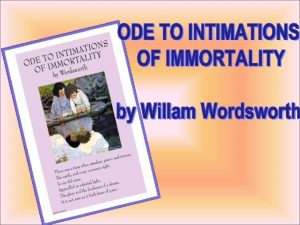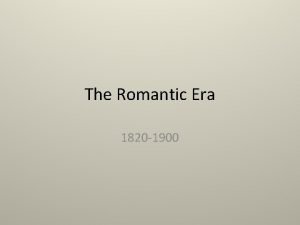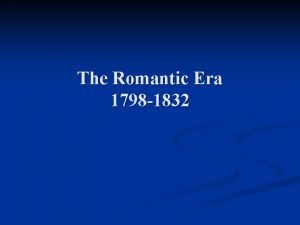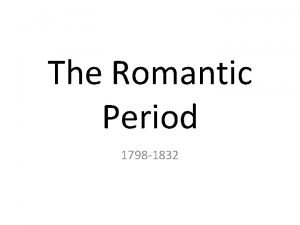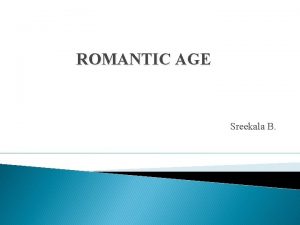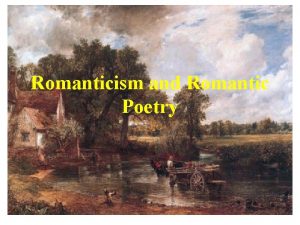WORDSWOTH AS A ROMANTIC CRITIC Wordsworth was the




























- Slides: 28

WORDSWOTH AS A ROMANTIC CRITIC • Wordsworth was the first to give a new turn to discussion as the nature of poetry by connecting it with feeling and making it dependent upon imagination. • His views on language and poetic diction are even more strikingly original. They were so original, indeed that they provoked much criticism when they were first produced.

• Wordsworth tries to bridge the gulf between prose and verse. • Later Wordsworth pleads that prose and metrical compositions make use of the same material, namely words and phrases and speak to a same sense. • Meter adds no novel distinction to the language such a distinction emanates only from passionate use of language and is thus generic not specific. • Words of prose and poetry are not clearly demarcated so the words which can be used in prose can find place in poetry and vice versa.

• Wordsworth makes it clear that the use of meter in poetry is different from the use of poetic diction. • Meter obeys certain rules where as poetic diction is arbitrary and capricious. • In the preface, Wordsworth has defended meter on the grounds.

• (i)It adds charm and pleasure to the language.

• (ii)Poems written upon humble subjects and in a more naked and simple language than the poets own compositions have continued to give pleasure from generation to generation.

• (iii) The end of poetry is to produce excitement. In the statement of excitement ideas and feelings do not follow each other in the accustomed order. Meter retrains and tempers the eciteest.

• (iv)Pathetic and painful situation can b rendered more effectively in rhyme than in prose. • (v)It imparts a dream like quality to the poem because of which the pain seems remote and more endurable.

• (vi)It imparts passion to the words and makes the reader experience appropriate feelings of pleasure. • (vii) We derive pleasure from perception of similarity in dissimilarity. The use of meter provides the element of contrast.

PREFACE TO THE LYRICAL BALLADE

• Wordsworth wrote the preface with a view to provide a kind of introduction to his poems which was considered by him to be new both in theme and style. • He didn’t want to present his poems to the public without telling them as to why he didn’t follow the conventional style and theme of neo-classical poetry.

• The preface explains the way in which his poems differ from the popular tradition of the age”Every new and original poet has to create the taste by which he is read and enjoyed and the creation of such a taste was Wordworth’s basic objective in writing the preface”.

• In his preface he demolishes the neo-classical poetry, and present his own theory of poetry that his poems are read and appreciated. In the preface, Wordsworth discusses the nature and function of poetry and poetic process the qualification of a poet and the poetic truth. • He regards poetry superior to philosophical history and science. In a way the preface is a landmark in the history of literary criticism.

• The preface to the Lyrical Ballad was perhaps more remarkable than the poems themselves for in the preface theory of new poetry of the romantic age was laid down with great deal leaving no scope for ambiguity and doubt. • It was in the preface that Wordsworth made bold and categorical statements regarding the nature of poetry and function of criticism and the ole of the poet as a creative artist.

• This preface is one of the master pieces of English criticism it is intelligent subtle yet extremely clear and provocative. • The preface makes us understand the subject matter of poetry is whatever interest. The human mind(that is if a thing is interesting, it doesn’t mean at all to say that this undignified or unpoetic. • The Lyrical Ballad were written as experiments to try out the use of language. • Conversation of real people is poetry. • They are new and unusual and will not suit the taste of most readers, Nevertheless, the reader is asked to try them with an open mind and not to be putt off at first sight without giving them a fair trial.

• In the preface to the lyrical ballade Wordsworth says that he has used language and situations from “low and rustic” life because in low and rustic life man is more simple , more direct and nearer to his elemental passions and less affected and artificial in the way he expresses his passions. • The language of poetry he says should not be different from the language of prose in the same way poetry doesn't require specifically poetic subjects, it doesn't deal with grand or the dignified or the sensational but with the permanent interest of human heart.

• Wordsworth says that “poetry is the breath and finer spirit of all knowledge”and that “poetry is the spontaneous overflow of powerful feelings”taking its origin from emotions collected in tranquility” • The qualification of the poets are laid down in conformity with the dignity of his art. • To Wordsworth a poet is who”possessed of more than usual organic sensibility”and one who has also “thought long and deeply”

• The first preface to Lyrical Ballad was published in 1800. It was revised and enlarged for the 1802 edition of the lyrical Ballade. In the preface of 1802 edition Wordsworth added a long account of the nature and function of poet. He answered this question in his own characteristic manner as to what is a poet? • He declared poet superior to the man of science and analyzed the nature of poetic pleasure. To this edition Wordsworth also added an appendix on Poetic diction. • Wordsworth continued revising and perfecting the preface in each subsequent edition. • In the edition of 1815 this preface appeared as Appendix and the volume was provided with an entirely new preface. to this volume Wordsworth also added an essay supplementary to the preface. • The preface that we study today is that of 1802.

• Wordsworth says in the preface that although the poet feels for the man and about man and he should write in a way that is understood by men. • The poet also possesses powers of communication, memory and passion. • In the preface he makes an attempt to define what makes a poet write poetry. • Some of his remarks such as “emotions recollected in tranquility” and “spontaneous overflow of emotions” are deservedly famous.

• He is one of the first writers who alter to describe the inner creative process. Perhaps his best and clearest definition of a poet is of the man “who being possessed by more than usual organic sensibility has also thought long and deeply” • A good poet is not first of all a thinker and a philosopher not is first of all a sensitive soul putting forth his own passions. He must write the two qualities of thought and feelings. He is different from the other men not in kid but in degree of his qualities, which make him write that which others feel but cannot express.

• In the preface Wordsworth covers an enormous stretch of ground, throwing out quite effortlessly the most acute observations on the relationship of poetry and science on the use of metre , at the place of pleasure in art and as the history of poetry. • It raises almost every knotty aesthetic problem one can think of and deals with them with an amazing confidence and energy after reading it.

• Wordsworth at least had thought long and deep and “indolence” is the least thing he could be accused of. • It is a pleasure to read someone who is sure of his own mind at the same time has nothing dry and opined about him. • This preface leaves a final impression of a quite extraordinary combination of creative and critical power of passion and thought. • It marks the beginning of a new age.

• Wordsworth sought to bring about a distinct change from the practice of the preceding generations. • He doesn’t recognize any unbridgeable gulf between science and poetry. He disproves the idea that with the advancement of science poetry declines. • On the other hand he is of the view that with the advancement of science poetry becomes familiar with the scientific principles and scientific phraseology and adjusts itself to the new idioms for expressing new thoughts. He has a liberal attitude towards science and that is appreciable.

• Wordsworth has mentioned the idea of imitation in the preface(1800) and it is appropriately indicated how poetry is distinguished from history deals in generations, • Wordsworth subscribes to the view that to the poet the particular is nothing and universal is everything. • As regards the end of poetry, Wordsworth make a departure from Aristotle. For Aristotle plot is the primary thing. The idea of delight as the end of poetry is neither explicitly nor elaborately mentioned. On the other hand Wordsworth emphasizes pleasure to be the end of poetry.

WORDSWORTH’S THEORY OF POETRY • Wordsworth has described theory of poetry and his conception of the function of a poet. In his theory of poetry he set down the origin, nature and purpose of poetry and the function of the poet in a civil society.

• Wordsworth defines poetry as the spontaneous overflow of powerful feelings, it takes its origin from emotions recollected in tranquility, the emotion is contemplated till the tranquility disappears and an emotion kindered to that which was before the subject of contemplation is gradually produced and does itself actually exist in mind.

• The clear spring of poetry must flow spontaneous and freely it cannot be made to flow through artificially laid pipes. Poetry is born not in the mind, but in the heart overflowing with feeling. Poetry is produced by a man who being possessed of more than organic sensibility had also thought long and deep.

• Wordsworth was dissatisfied with the 18 th century poetry. He was not happy with the contemporary poetry for a number of reasons and composed poems which differ from the neo-classical poetry both in matter and manners. In the content as well as in their style.

• Wordsworth felt a regret that some of his contemporaries have introduced trivialities and meanness of thought and language in their metrical composition But Wordsworth poems differs from those of his contemporaries of that of enlightening the readers and purifying their affections. • He castigates poets who separate themselves from sympathies of men and who indulge in arbitrary and capricious habits of expression in order to furnish food to fickle taste and fickle appetites of their own creations.
 Romantic criticism wordsworth
Romantic criticism wordsworth New deal critic dr francis townsend
New deal critic dr francis townsend Characteristics of literary criticism
Characteristics of literary criticism Lightweight markup
Lightweight markup Horace literary criticism ppt
Horace literary criticism ppt Ron weasley outline
Ron weasley outline Art critique examples
Art critique examples It is not the critic who counts
It is not the critic who counts Formalism vs structuralism
Formalism vs structuralism Inner critic and inner defender
Inner critic and inner defender Actor critic network
Actor critic network Preface to the fables
Preface to the fables By listening to my inner defender voice, i can be sure that
By listening to my inner defender voice, i can be sure that Chúa yêu trần thế alleluia
Chúa yêu trần thế alleluia Khi nào hổ mẹ dạy hổ con săn mồi
Khi nào hổ mẹ dạy hổ con săn mồi đại từ thay thế
đại từ thay thế Vẽ hình chiếu vuông góc của vật thể sau
Vẽ hình chiếu vuông góc của vật thể sau Cong thức tính động năng
Cong thức tính động năng Tỉ lệ cơ thể trẻ em
Tỉ lệ cơ thể trẻ em Thế nào là mạng điện lắp đặt kiểu nổi
Thế nào là mạng điện lắp đặt kiểu nổi Dạng đột biến một nhiễm là
Dạng đột biến một nhiễm là Lời thề hippocrates
Lời thề hippocrates Vẽ hình chiếu đứng bằng cạnh của vật thể
Vẽ hình chiếu đứng bằng cạnh của vật thể Quá trình desamine hóa có thể tạo ra
Quá trình desamine hóa có thể tạo ra Phản ứng thế ankan
Phản ứng thế ankan Các môn thể thao bắt đầu bằng tiếng bóng
Các môn thể thao bắt đầu bằng tiếng bóng Khi nào hổ mẹ dạy hổ con săn mồi
Khi nào hổ mẹ dạy hổ con săn mồi điện thế nghỉ
điện thế nghỉ Nguyên nhân của sự mỏi cơ sinh 8
Nguyên nhân của sự mỏi cơ sinh 8
